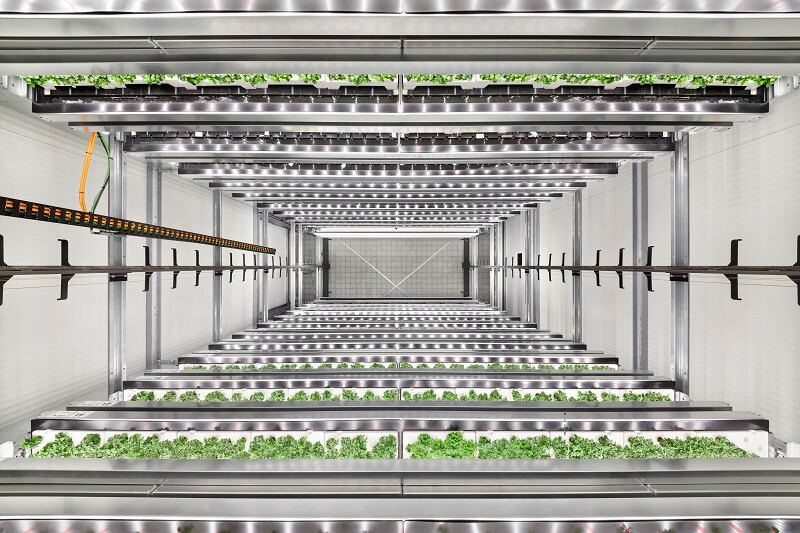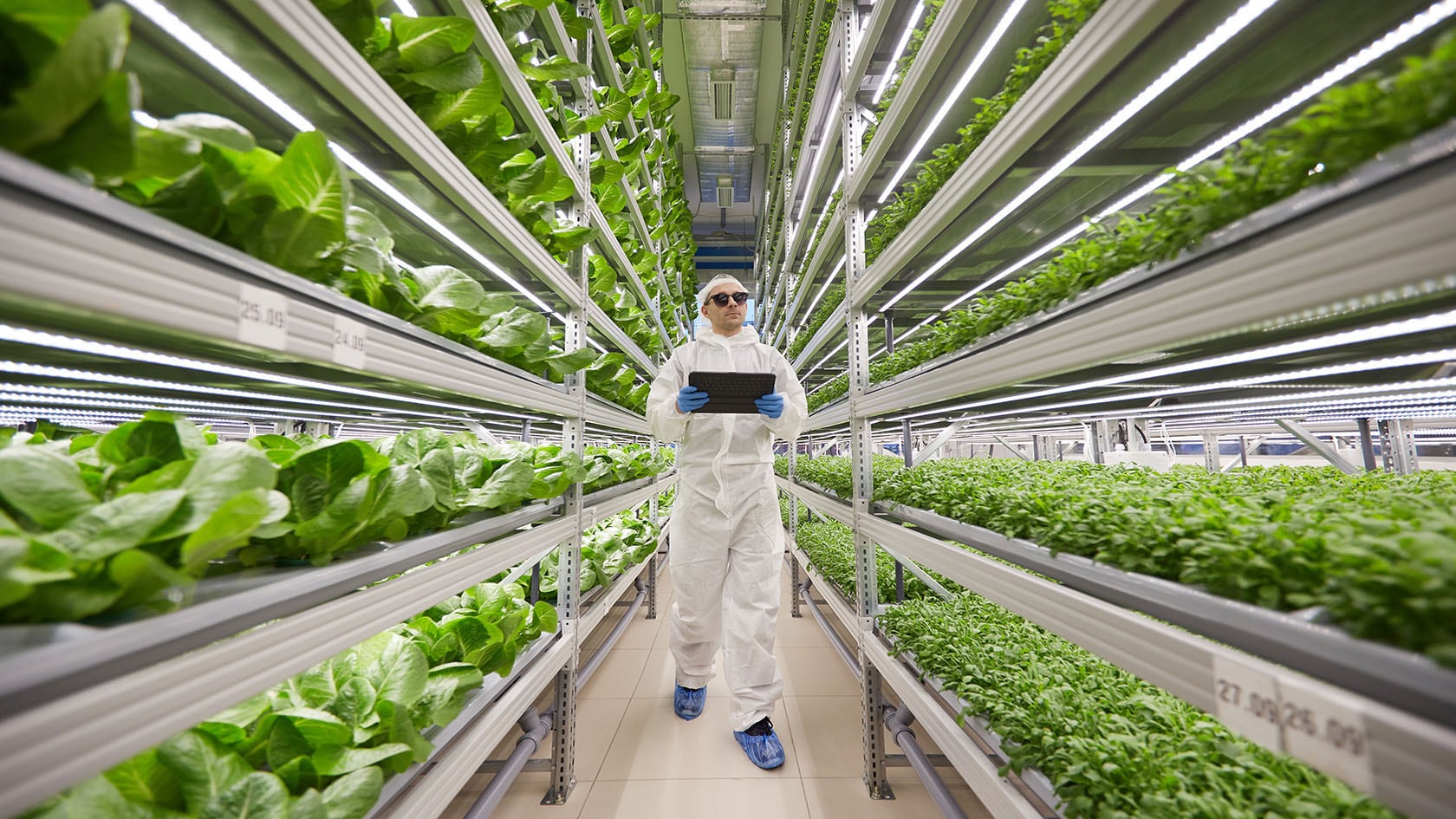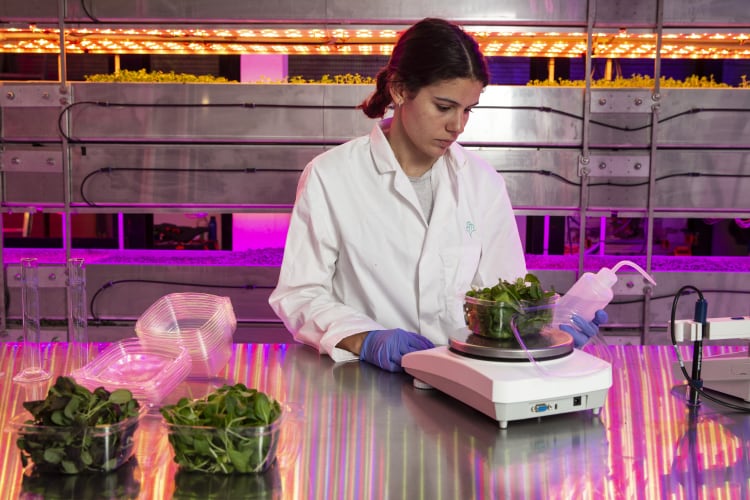Unlike its rivals in the vertical farming sector, Infarm installs modular 'mini-farms' which are located within supermarkets and restaurants in Germany, Denmark, France, Luxembourg, the Netherlands, the United Kingdom and Switzerland.
These are currently available in 10 countries and 30 cities in thousands of stores covering 50,000 m2 and providing fresh produce to 50% of the world’s largest food retailers including Marks & Spencer, Kroger, Aldi, Amazon, E.Leclerc, Intermarché and Irma.
The Berlin-based company has now unveiled new high-capacity, cloud-connected Growing Centers, which it calls a major step in its efforts to accelerate the benefits to people and planet by building a scalable, sustainable and resilient global farming network.
It says the new high-yield Growing Centers will drive additional global growth and scalability to match the needs of retailers of any size in any location, with the goal of growing the network to 500,000 m2 by 2025.
By 2025 Infarm plans to open 100 Growing Centers -- equivalent to 1.5 million m2 of farmland and producing 450,000,000 plants across its network, including expanding to new markets. This year, 15 Infarm Growing Centers are planned/or under construction in major urban centers, including London, Paris, Copenhagen, Toronto, Vancouver, Seattle and Tokyo.
Additional features of the new Infarm technology:
- An automated mechanical farming system that is cloud controlled;
- Environmental settings like CO2, temperature, light, pH and growth cycles can be set, monitored, analyzed online across all farms;
- Recirculates 20 litres of water condensation per hour and, saving more than up to 10,000,000 litres of water per year compared to soil-based agriculture for similar crops;
- Smart LED management supports energy efficiency offering contributes up to 40% energy savings & up to 25% savings on initial investment.
An Infarm spokesperson told FoodNavigator the Growing Centers are equipped with new farming units that can generate the crop-equivalent of up to 10,000 m2 of farmland, with up to 400 times higher efficient food production than soil-based agriculture.
These farms stand between 10 and 18 meters high, occupying a 25 m2 ground footprint, and require just six weeks to build, yielding the crop-equivalent of 10,000 m2 of farmland.
“Our approach to both the hardware and software of our growing centres allows us to meet full retailer demand, while remaining flexible and responsive to retailer adjustment in assortments, based on seasonality, promotions, and holidays year-round,” they said.
“With the new technology and the advantages of plug-and-play modularity of our farming technology, we can also open and scale facilities much more quickly to meet client demand.”
The company expects economies of scale, increased modularity and the evolution of associated technologies like LEDs and energy will drive costs down industry-wide over time.
“This has already begun and will only accelerate over the next few years. With a network of Infarm Growing Centers in cities and countries around the world, we come closer to achieving our goal of shortening the food supply chain, reducing food-miles and offering the freshest, local produce to retailers and consumers everywhere,” we were told.
Infarm’s expanding global network of self-learning farms can improve plant yield, taste, and nutritional value constantly, while further reducing the use of natural resources, the spokesperson added.
“Industrial agriculture depends on the large-scale production of plants that need to travel long distances to reach consumers. Plant seeds and sources are chosen based on how much they will yield, how far they can travel, how easily they can be packaged, and how long they can stay on the shelf. Taste is a low priority in this final equation.”
Infarm further accused industrial farms of typically using large quantities of pesticides, destroying the soil’s natural ecosystem and biodiversity while reducing the natural nutrients, quality and taste of the final plant.
“At Infarm we’re distributing the farms themselves throughout the city — bringing nutritious produce so fresh it is still living, as close as possible to consumers with 95% less water, 90% less transport and 0 chemical pesticides. Our Growing Centers bring what we’ve been doing from the beginning to a scale that can match retailers of any size anywhere in the world.”
“Access to fresh, local and sustainable food is a growing challenge, as people shift towards cities and climate change accelerates. Today we’re adding speed to scale with new technology that allows us to deploy a Growing Center to any city in the world in a fraction of the time, space and capital investment of most large-scale farming solutions today. Both the farms and the software that powers them were designed to make fresh food more accessible for everyone, everywhere.”
Erez Galonska, co-founder and CEO of Infarm
Onwards and upwards
According to Sky News, Infarm will reap $250m from its next fundraising round, a move which will give it 'unicorn' status (a privately-owned start-up with a valuation exceeding $1 billion) and also underscore the demand for solutions that attempt to address food supply problems, which have become particularly intense during the coronavirus pandemic.
The company also hopes the technologic advancements will further enable it to expand its product portfolio away from its current offering of mainly locally grown herbs, leafy greens and lettuce.
“We’re already working on mushrooms, tomatoes and other vegetables that will appear in the next few months,” Galonska added. “Our ultimate goal is to offer a full basket of produce that would appear in retailer fruit and vegetable aisles.”




